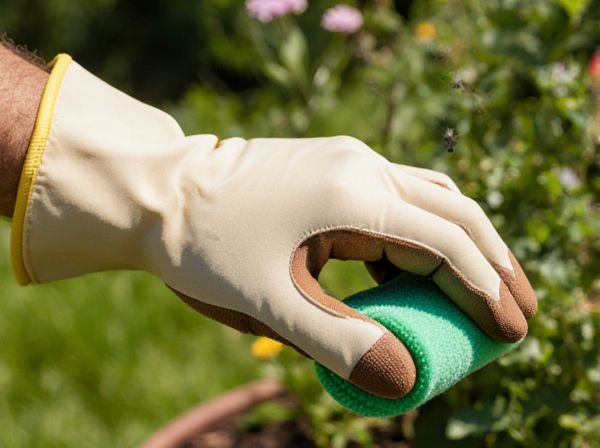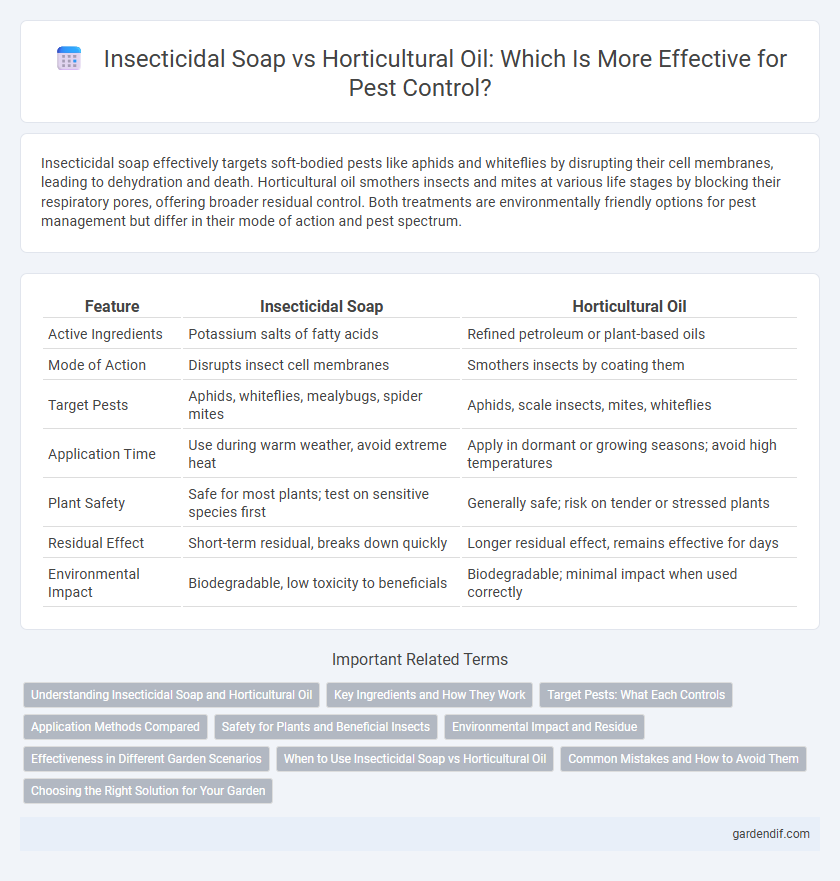
insecticidal soap vs horticultural oil Illustration
Insecticidal soap effectively targets soft-bodied pests like aphids and whiteflies by disrupting their cell membranes, leading to dehydration and death. Horticultural oil smothers insects and mites at various life stages by blocking their respiratory pores, offering broader residual control. Both treatments are environmentally friendly options for pest management but differ in their mode of action and pest spectrum.
Table of Comparison
| Feature | Insecticidal Soap | Horticultural Oil |
|---|---|---|
| Active Ingredients | Potassium salts of fatty acids | Refined petroleum or plant-based oils |
| Mode of Action | Disrupts insect cell membranes | Smothers insects by coating them |
| Target Pests | Aphids, whiteflies, mealybugs, spider mites | Aphids, scale insects, mites, whiteflies |
| Application Time | Use during warm weather, avoid extreme heat | Apply in dormant or growing seasons; avoid high temperatures |
| Plant Safety | Safe for most plants; test on sensitive species first | Generally safe; risk on tender or stressed plants |
| Residual Effect | Short-term residual, breaks down quickly | Longer residual effect, remains effective for days |
| Environmental Impact | Biodegradable, low toxicity to beneficials | Biodegradable; minimal impact when used correctly |
Understanding Insecticidal Soap and Horticultural Oil
Insecticidal soap works by disrupting the cell membranes of soft-bodied insects, causing dehydration and death, making it highly effective against aphids, mites, and whiteflies. Horticultural oil functions by suffocating pests such as scale insects, mealybugs, and spider mites through a physical coating that blocks respiration. Both products are valued for their low toxicity to beneficial insects and suitability for organic gardening, but their modes of action and target pests differ significantly.
Key Ingredients and How They Work
Insecticidal soap contains potassium salts of fatty acids that disrupt insect cell membranes, causing dehydration and death. Horticultural oil is primarily made of refined petroleum or plant-based oils that suffocate pests by blocking their respiratory pores. Both products target soft-bodied insects, but insecticidal soap acts through cell disruption while horticultural oil works by physical smothering.
Target Pests: What Each Controls
Insecticidal soap effectively controls soft-bodied pests such as aphids, whiteflies, and spider mites by disrupting their cell membranes, leading to dehydration. Horticultural oil targets a broader range of insects including scale, mealybugs, and scale insect eggs by suffocating them through a physical coating. Both treatments are integral to integrated pest management, providing non-toxic options for controlling different pest life stages on plants.
Application Methods Compared
Insecticidal soap is typically applied as a direct spray targeting soft-bodied insects like aphids and mites, requiring thorough coverage of affected plant areas to disrupt pest cell membranes. Horticultural oil works by suffocating pests such as scale insects and whiteflies and is usually applied as a fine mist ensuring complete contact with the pest and plant surfaces. Both methods demand careful timing during low wind and cooler parts of the day to maximize effectiveness and minimize plant damage.
Safety for Plants and Beneficial Insects
Insecticidal soap is generally safer for plants and beneficial insects as it works by disrupting the cell membranes of soft-bodied pests without leaving harmful residues, making it less likely to cause phytotoxicity or harm pollinators. Horticultural oil, although effective against pests by smothering them, can cause leaf burn or stress under high temperatures and may be more toxic to certain beneficial insects if misapplied. Selecting the appropriate treatment based on plant sensitivity and timing applications during low pollinator activity enhances overall safety for both plants and beneficial insect populations.
Environmental Impact and Residue
Insecticidal soap breaks down quickly into harmless substances, leaving minimal residue and posing low environmental risk, making it safer for beneficial insects and aquatic life. Horticultural oil also degrades rapidly but might leave a thin, temporary film on plant surfaces, which can reduce photosynthesis if overapplied, yet it is generally considered environmentally friendly. Both options offer low-toxicity pest control with reduced chemical buildup compared to synthetic pesticides.
Effectiveness in Different Garden Scenarios
Insecticidal soap is highly effective against soft-bodied insects like aphids and whiteflies, making it ideal for vegetable gardens and ornamental plants. Horticultural oil excels in smothering overwintering pests and scale insects on woody plants and fruit trees, providing longer-lasting protection. Both products offer eco-friendly pest control but should be selected based on the specific pest type and garden environment for maximum effectiveness.
When to Use Insecticidal Soap vs Horticultural Oil
Insecticidal soap is most effective on soft-bodied insects like aphids, whiteflies, and spider mites during early infestations when pests are actively feeding on plant surfaces. Horticultural oil works best against scale insects, mealybugs, and overwintering pests by smothering them, and is ideal for use during dormant seasons or when foliage is dry and healthy. Choosing between the two depends on pest type, infestation stage, and plant condition to maximize control efficiency.
Common Mistakes and How to Avoid Them
Common mistakes when using insecticidal soap include applying it under direct sunlight, which can cause leaf burn, and not covering both sides of leaves, reducing effectiveness against pests. With horticultural oil, users often apply it at incorrect dilution rates or during high temperatures, increasing plant damage risk. Avoid these errors by following label instructions carefully, spraying during cooler parts of the day, and ensuring thorough coverage for optimal pest control.
Choosing the Right Solution for Your Garden
Insecticidal soap effectively targets soft-bodied pests like aphids and spider mites by disrupting their cell membranes, making it ideal for quick control in organic gardens. Horticultural oil works by smothering insects and their eggs, providing a broader spectrum of pest control including scales and whiteflies, and is best applied during dormant periods or early growth stages. Selecting the right solution depends on pest type, plant sensitivity, and application timing to maximize garden health and pest management efficiency.
insecticidal soap vs horticultural oil Infographic

 gardendif.com
gardendif.com